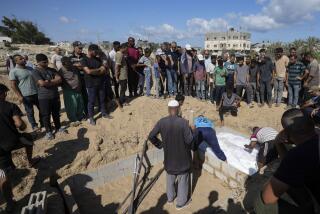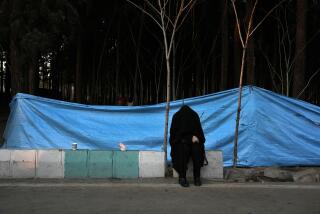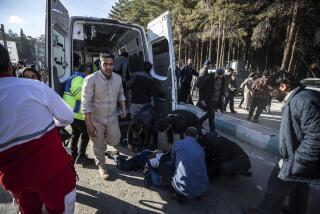U.S. Defends Security Setup in Iraq
- Share via
BAGHDAD — U.S. officials in Iraq defended their security procedures Wednesday as the death toll in the coordinated suicide bombings of Shiite Muslim targets soared toward 300 and angry mourners raged against the occupying forces.
Iraqi Governing Council members who met the media Wednesday attempted to head off the impression that the country was sliding into a period of murderous anarchy after the carnage on Ashura, the holiest Shiite holiday period. It was the worst violence since Saddam Hussein was overthrown by a U.S.-led coalition last year.
“We’re nowhere near civil war, and it will never happen in this country,” said Mouwafak Rabii, a member of the Governing Council. The attacks have sapped the sense of progress that was so apparent when the council agreed this week on an interim constitution to run the country after the return of sovereignty to Iraq, scheduled for June 30.
Iraqi authorities said good police work helped foil other potential attacks in the largely Shiite cities of Najaf and Basra. In Najaf, a pair of car bombs were found before the vehicles could be driven into a religious procession and detonated, said Seyyid Mohammed Bahr Uloom, current president of the Governing Council.
Top U.S. civilian and military officials -- L. Paul Bremer III and Lt. Gen. Ricardo Sanchez -- expressed their condolences and reaffirmed their confidence in the Iraqi security forces.
“It is increasingly apparent that a large part of this terrorism comes from outside the country,” said Bremer, detailing plans for increased patrols along Iraq’s long and porous borders.
Although Governing Council members agreed that foreign terrorists might be at work, longtime observers continued to blame die-hard backers of Saddam Hussein for orchestrating much of the violence. The two groups may even be working in a loose alliance, Iraqi and U.S. officials said.
U.S. officials said 15 people -- five Iranians and 10 believed to be Iraqis -- were detained in connection with the bombings in Karbala. The 15 were being held for questioning and were not necessarily suspects in the case, one official said.
Two men detained in connection with the Baghdad bombing have been released, officials said. Authorities described as erroneous an earlier report that a suspected suicide bomber with an explosives belt had been detained in Baghdad.
A total of 271 people were killed and 393 injured in Tuesday’s nearly simultaneous bombings in Karbala and at Baghdad’s Kadhimiya shrine, Uloom said. U.S. officials put the number of dead at fewer than 200, highlighting ongoing confusion about the toll.
Meanwhile, a top official said the U.S. military was informed of imminent attacks before the bombings and probably prevented more casualties by staging raids the night before, Army Gen. John Abizaid told members of Congress on Wednesday.
U.S. officials have speculated that a terrorist group keen to spark a civil war between Iraq’s Shiite and Sunni Muslim populations may be behind the bombings. But authorities have offered no proof of their allegations that the attacks are probably the work of Abu Musab Zarqawi, a Jordanian militant with links to the Al Qaeda terrorist network.
“We have clear intelligence that ties Zarqawi to this attack,” Abizaid said, adding that there are “linkages” between Zarqawi and loyalists of the former regime, especially the former Iraqi intelligence services.
The FBI is providing technical assistance in investigating the bombing attacks, U.S. officials said.
In Karbala, the highly choreographed burning of a U.S. flag interrupted a procession of funerals at the shrine of Imam Hussein. Mourners in both Karbala and Baghdad faulted U.S. security procedures. “America is the enemy of Allah!” mourners chanted in Karbala.
Among those burying his dead on Wednesday was Sheik Ghulami, one of many visitors from Iran who had crossed the border to spend the holiday in the city where the revered Imam Hussein is said to have lost his life more than 1,000 years ago.
Ghulami’s entire family -- wife, three daughters and two sons -- were among those killed by a bomber who detonated his payload near the gold-domed shrine of Imam Abbas. A distraught Ghulami kissed the white-shrouded body of his daughter Mutahara before committing her to the sacred earth of Karbala’s new cemetery, known as the Paradise of the Martyrs.
The attacks in Karbala involved nine separate explosions, the Governing Council said, using three suicide bombers, five pushcarts laden with explosives and one land mine.
Three suicide bombers attacked the mosque in Baghdad, police said.
U.S. military and political leaders hastened to deny the widespread allegations that security was inadequate. They also disputed the notion that the bombings underscored the ill-prepared state of Iraqi police forces as the U.S.-led coalition prepared to return sovereignty to Iraqis.
“Any Monday-morning quarterbacking ... is relatively unhelpful and doesn’t really get to the root of the problem,” Brig. Gen. Mark Kimmitt, a military spokesman, told reporters in Baghdad.
Under the security plan, Kimmitt said, U.S. and coalition forces staffed outer cordons some distance from the holy sites where pilgrims were headed. Iraqi police and Iraqi civil defense troops were positioned somewhat closer while shrine police and various Shiite armed factions provided security in the immediate vicinity of the mosques.
“So it was generally three rings of security primarily focused on preventing car bombs from coming into the middle of the crowd,” Kimmitt said.
No car bombs struck, but suicide attackers managed to infiltrate the scene and blow themselves up amid the throngs of worshipers, leading to mass casualties.
In Karbala, people were able to enter the densely packed shrine zone after quick pat-downs. Several vehicular checkpoints seemed more pro forma than rigorous. Still, U.S. officials said, the plan seemed adequate to protect the expected crush of pilgrims descending on the sites for Ashura, which marks the death of Imam Hussein.
Times staff writer John Hendren in Washington and researchers Suhail Ahmed in Karbala and Salar Jaff in Baghdad contributed to this report.
More to Read
Sign up for Essential California
The most important California stories and recommendations in your inbox every morning.
You may occasionally receive promotional content from the Los Angeles Times.










